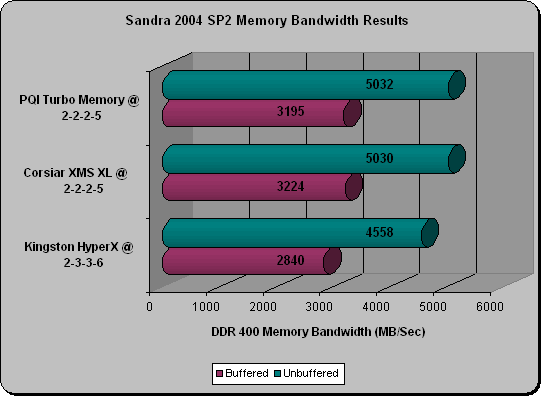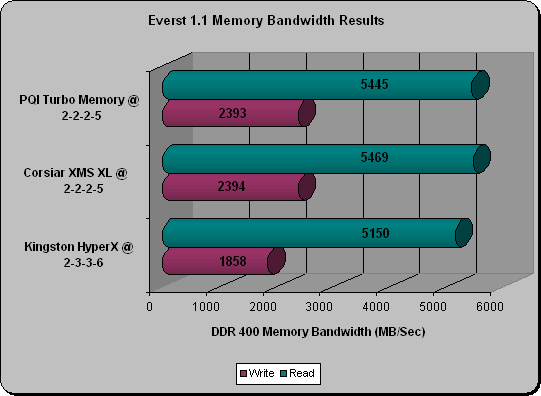PQI Turbo Memory — Enthusiast Memory??
Memory Performance
Our Test System:
- Intel Pentium 4 3.4E 800MHz FSB (Intel ES unlocked Sample)
- Asus P4C800-E Deluxe Canterwood Motherboard
- ASUS 9600 XT Pro 128mb
- Corsair HydroCool 200ex (Water Cooled CPU/Northbridge)
- Seagate 120Gb Serial ATA 150 Hard drive
- Antec True Power 430W Power Supply
- 17″ Sony Trinitron monitor
- Asus BIOS version 1017
Testing Procedure:
All testing was done on a fresh install of Windows XP Professional build 2600 with Service Pack 1A and DirectX 9.0b. All benchmarks were completed on the desktop with no other software programs running. No overclocking was done on the video card unless noted. Our testing processor was an unlocked Intel Pentium 4 3.2C. Our testing was done at:
- DDR 400: 200×16 = 3.2GHz with H/T, Performance Acceleration Mode, and Turbo enabled in BIOS
The audio, USB, Firewire, and lan features were disabled in the BIOS menu for all the testing competed during this review. All memory was set at the timings noted in the graphs. All testing was completed at 2.75Vdimm unless otherwise noted!
Sisoft; Sandra 2004:
Sisoft Sandra 2004 is designed to test the theoretical power of a complete system and individual components. The numbers taken though are, again, purely theoretical and may not represent real world performance. Higher numbers represent better performance in memory bandwidth.

Everest Version 1.1:
Everst 1.1 is a professional system information, diagnostics and benchmarking program for Win32 platforms. It extracts details of all components of the PC. It also tests the actual read and write speeds of your memory giving a fairly accurate look of true memory performance.

ScienceMark 2.0 Beta:
ScienceMark 2.0 is different from other benchmarks, in a sense the benchmark tests a series of different memory bandwidth algorithms. To top it all off the assembly source for these copy routines is available online to help assure the benchmark is not biased towards any one platform in particular.

Memory Bandwidth Results:
It is obvious that the PQI Turbo Memory and Corsair XMS XL memory are performing at roughly the same performance level. We included Kingston’s HyperX PC-3200 memory using the old IC’s that were on PC-3200 memory before all the companies started using the Samsung TCCD IC’s on their memory. Kingston also carries a HyperX line of memory using the Samsung TCCD IC’s in case you are a Kingston fan. As you can tell, the “best” memory from a few months ago was beat by both the new Corsair XMS XL and the PQI Turbo memory.
So far PQI looks to be hanging in there with Corsair, one of the best known enthusiast lines of memory in the world.

Comments are closed.